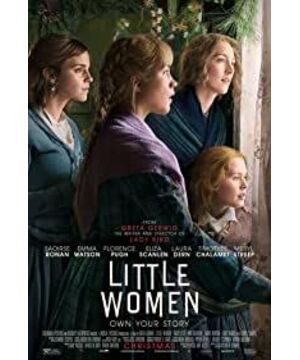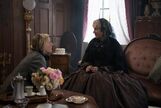Affected by the epidemic, movie fans have not been able to watch movies in the cinema for a long time. The new version of "Little Women" originally scheduled to be released at the end of March has been repeatedly postponed, but its high reputation after its release in the United States has won the expectations and attention of movie fans around the world. At the just past Oscars, the new version of "littlewomen" was also nominated for the Oscar for Best Director and Best Adapted Screenplay. It is considered one of the few female films in this year's Oscars.
The director of the film is Greta Gerwig, who has directed "Miss Bird". She is also one of the more important female directors in Hollywood in recent years. Her past lives and works all reflect a kind of The attention of contemporary feminism is so strong that many people did not understand why she wanted to direct a "costume drama" at first.
In fact, including this new version of "Little Women", the film based on the novel of the same name already has at least a dozen versions worldwide. Not only Hollywood has adapted this novel several times, but also film works adapted from it in Japan, South Korea, and Hong Kong, China have also come out one after another in East Asia. Previously, the 1933 Catherine Hepburn edition, the 1994 Winona Ryder edition and the BBC edition were the most famous.
In the more than one hundred years since its birth, countless women have used this novel as their enlightenment reading, and there have been countless movie works to interpret this female story about family love and growth. What makes "Little Women" so long-lasting? What kind of inspiration can today's women get from this classic work?
Author | Yu Yaqin
This article was first published on the WeChat public account: Beijing News Book Review Weekly, welcome to follow.
01
"Little Women" is a product of the American feminist movement,
Demonstrates the spirit of the times
"Little Women" is a novel written by American female writer Louisa May Alcott, first published in 1868. At that time, the Civil War, which played a decisive role in American history, only ended for three years, and the story of the novel took place during the war. Therefore, what we think of as the "costume drama" today is indeed a contemporary novel in the era of "Little Women", which embodies the American zeitgeist in the mid-nineteenth century, and can be regarded as the first wave of feminist movement. The product.
The story of "Little Women" has a strong autobiographical nature, and the heroine Joe is based on Alcott himself. She described the life and emotional stories of the four sisters of the March family in New England, the United States. The fate of these four girls can also be seen as several different life choices of American women at that time.
The novel was influenced by the thinker Emerson, emphasizing the concept of personal dignity and self-reliance and self-discipline. This plain and detailed novel has a kind of instructive power. This is also the basis for it to sell well for more than 100 years.
Alcott was born in 1832 in a poor family in Pennsylvania, USA. Her father was a philosopher and educator with no ambitions. He was determined to run a school all his life, but all ended in failure. Like the father Mr. March in the novel, he spends all his time in the study, pursuing moral self-improvement. The family is gradually falling into poverty, and the burden of life falls on the able mother.
In order to share the tiredness of the family, Alcott went out to work very early, as a tutor, elementary school teacher, and hospital nurse. Later, he took care of a noble lady and traveled around Europe with him. She helps the family, works hard, loves freedom, and is unmarried for life. After becoming famous, Alcott not only published novels, but also actively devoted himself to social affairs. Dedicated to the women's election campaign and the prohibition movement. Later, she also served as the editor of a children's publication "Robert Merry's Museum".
How to understand the contemporary value of "Little Women", we should first examine this book in the era when it was born. When Alcott grew up, it was the first wave of the women's liberation movement. The focus of the early feminists' appeals and debates is simply gender equality, opposition to aristocratic privileges, and reaffirmation of the sanctity of monogamy. At the same time, they also demand equality in civil and political rights, intellectual and abilities.
In the 1840s, the early feminists in the United States began to run actively. In July 1848, hosted by Mrs. Mott and Elizabeth Cady Stanton, the first American Women’s Rights Conference was convened and the "American Women’s Declaration of Independence" was passed, which gave the American feminist movement a clearer direction. Fighting for women's right to vote is included in the goal of the feminist movement. Stanton asserted: "Men and women are born equal." She publicly demanded that the state protect the basic right of women deprived-the sacred right to vote.
However, the top priorities for American women at that time were mainly property rights, the right to education, and the freedom of divorce, and the right to vote was delayed. When the General Assembly voted on twelve resolutions for women in economics, education, law, religion, and voting rights, only the right to vote was not approved by all, and only passed by a small majority.
The fourteenth and fifteenth constitutional amendments passed in 1868 and 1870 respectively set out what nationality is, how to conduct elections for members of the House of Representatives, citizens enjoy equal rights to be protected, and citizens shall not be subject to (factors other than gender). ) Restrictions on the right to vote. Both constitutional amendments have had a huge impact on the history of the United States, but they have not given women the right to vote, and therefore they have also inspired a series of campaigns for women to fight for their right to vote.
In 1890, American women established the "National Association for Women's Political Participation", which united the women's political participation in their own struggles and brought the struggle for the right to vote into a new stage. The women's movement has swept the country from west to east, with increasingly diversified and radicalized forms of struggle, demonstrations, pickets, condemnation of political candidates, hunger strikes, and so on. Under the strong pressure of the women’s movement, some political leaders also openly supported women’s activities to demand the right to vote.
It is worth mentioning that although the 1994 version of "Little Women" did not escape the gimmick that focused on shaping romantic love and beautiful marriages, it creatively joined Joe and his friends in discussing women's rights to vote, and she finally The choice of marriage was also because her husband was completely on the feminist position on the issue of voting rights.
02
Not only focusing on the female emotional world,
It's a response to the rising period of capitalism
"Little Women" not only focuses on women's own destiny, but also reflects the atmosphere of the entire era. In an era when humanism is at its peak, reason and science are the magic weapons of mankind, the shackles of theology and patriarchy are slowly loosening, and the spirit of exploration is considered to be a very important part of the American spirit. Therefore, Joe's career pursuit can also inherit this spirit of exploration. Her dream of becoming a writer was an absolutely progressive expression in the 19th century. Before that, most of the writers of history and literature were men, while women could only fight for themselves as aristocrats (her father or husband was a nobleman). ) It is possible to obtain the possibility of writing. Therefore, the "Mad Woman in the Attic: Female Writers and the 19th Century Literary Imagination", known as the "Bible" of 20th Century Feminist Literary Criticism, asked: "If the pen is a metaphor for the penis, Austin, Mary Shelley, Sister Bronte...what do you rely on to write? Woman, do you choose to live your own way in the world or retreat behind the barriers of family life? Do you choose to speak or be silent, independent or dependent?"
Therefore, in the context of the 19th century, "Little Women" embodies Alcott's progressive consciousness, and also reflects the various conditions of American society at that time: the gap between class and the rich and the poor prevents the continuous widening, and the class solidifies the concept of hierarchy. Strictly, the middle and lower-class people lack access to education and women cannot have independent property rights and so on. She concentrated her views on these issues in the book "Little Women". Alcott is an attempter of bold reforms. She is a defender who strives for better working conditions and voting rights for women. Since it was difficult for women to receive education on the same level as men at that time, many feminists devoted themselves to the cause of private schools. Joe in "Little Women" finally inherited his aunt's real estate and decided to establish a girls' school, reflecting the turbulent atmosphere of the times. The author also used Mrs. March’s tone to express his disdain for the concept of “money first” during the rising capitalism. Mrs. March’s attitude towards her daughter’s marriage is: "I don’t want my daughter to be short of food and clothing in the future, but I don’t want it. They can't stand the temptation of money." And this concept is a typical American Puritan middle-class ethics from today's perspective.
Since the new version of the story breaks the linear narrative, our process of watching the new version is not as smooth as the previous version. We first know the fate of the characters before we gradually understand their history. Therefore, the images and life choices of the other sisters of the March family are more prominent and contemporary than the previous version.
The eldest sister Meg is the most beautiful and the lady who fits the aesthetics of the mainstream society at the time. She could have married a rich man, but because of love, she married a poor tutor. She represented the kind girl who was most in line with the mainstream aesthetics in society at that time. She was willing to forbear and make sacrifices for her husband, and she had some of the glory of the Virgin. In the new version, the role Emma Watson plays is more human. She will also envy the lives of the rich, and will also be annoyed by not being able to wear good-looking clothes... But who is the contemporary audience who will blame her for her vanity? Woolen cloth? On the contrary, she will be more respectful of her ability to break through the limitations of the times and choose the combination of the people she loves.
The story of the third sister Beth is the most tragic. She has a gentle and introverted personality, loves music, and is good at playing the piano. She is very affectionate. But this character contracted scarlet fever because of taking care of the sick poor and died. This character was given the most perfect moral expectations by the author. He was almost pure and flawless, and he was a perfect person. Her death elevated the moral power of women and at the same time enlightened the March family. They unite again, and several sisters have grown up.
The younger sister Amy is a character that has changed a lot in several versions. She has a flamboyant personality and a bit of vain, and her goal in life is to marry a rich man. But in fact, she can very well represent the ambitious female image of that era. When women do not have independent property rights, they can only change their destiny through marriage. Amy is young, beautiful and talented. Her dream is to become an artist, but in that era, only through the support of her husband and ample financial support could this dream be realized. Therefore, Amy initially chose Fred who could help her rise in class, but finally heeded the call of her heart and chose the mature Laurie as her life partner.
The change in Amy's inner world is a highlight of the new version of "Little Women". She knows how to seize every opportunity to gain space for her advancement, and she also has a clear understanding of her own destiny. It can be said that she and Joe are two sides of the progressive women at that time. Although on the surface she did not have Joe's rebelliousness and boldness, they also knew what they wanted and worked hard for it.
Mrs. March and aunt are also unforgettable roles in the "Little Women" movie. Mrs. March is the core cohesion of the family. It seems that the daughters like the father who is far away on the battlefield, but in fact it is the mother who manages everything. As a literary work of the Civil War, "Little Women" points out from the side that when men make contributions and write history on the front line, it is the foundation for women to support the family in the back. Mrs. March has very valuable Puritan qualities. She values education, is willing to give, is hardworking and simple, and is a typical image of American women.
The role of Aunt March seems to be mean, but in fact she is very sober. She admonished several girls that marrying wealthy people is not greedy for pleasure, but pointed out the reality that women can’t own their own property, and that only by marrying wealthier people can get more. Many life possibilities. Although she is a realist, she is insightful and socially critical. The aunt was unmarried all her life and kept her property, and finally left the big house to Sister March, fulfilling Joe's dream of opening a school.
What’s interesting is that in the previous version, Mr. March appeared as a loving father, occupying a lot of scenes, but the new version of "Little Women" downplays this role, only allowing him to appear at the end, highlighting The self-improvement of a woman in the absence of her father can be said to be a conscious removal of the patriarchal influence of the original work.
03
Reshaping and subverting the text,
Highlight contemporary female consciousness
The most similar to the new version of "Little Women" should be the 1994 version. The directors of the two films are both women, and both have launched the super idols of their respective eras to play the heroes and heroines in the films. Although it is only 25 years apart, we can see the changes in female consciousness and the concept of marriage and love in these years from the different details of the two versions.
Of course, no matter which version of "Little Women" is, it will not give up the emotional rendering of Joe and the beautiful man Laurie. The scene of her rejection of Laurie's proposal has broken the hearts of generations of viewers. We will all regret that the childhood sweethearts were not able to be together, and we will also admire Joe's rationality for relationship problems.
But Joe's rejection of Laurie, different versions have some differences in details. In the previous version, Joe's main reason for rejecting Laurie was that he hated high society and thought he was not suitable for Laurie, or that he was not worthy of him. In the 1994 version, Laurie promised Joe that he would take care of Joe's family and let them live a good life. Joe didn't need to write for money, which made Joe who wanted to become a professional writer feel unhappy.
In the new version, Joe goes a step further and points out to Laurie that he doesn't want to get married at all. A person can be very happy. He loves freedom so much that he doesn't want to give up freedom. Laurie refuted her, thinking that one day she would meet the one she loved and give her everything for it. The new version of "Little Women" portrays Joe's rejection of Laurie into a conflict between the old and the new concept of marriage.
The biggest difference between the new edition and all previous editions is the addition of bargaining between Joe and the bookseller. This story is not in the novel and is based on the real experience of the author Alcott. Alcott was unmarried for life, but she let her incarnation Joe finally marry a professor from Germany. The new version of "Little Women" gives my own answer here, which is to deal with the unspoken rules of the publishing industry at that time: if the ending heroine of a novel fails to marry a happy ending, this book is No one likes it. Since then, every version of "Little Women" has revised the love story of Joe and Professor to varying degrees, but it ended with their union.
Earlier versions will shape the professor's influence on Joe. He is not only a kind-hearted and simple person, but also a person with extraordinary learning and conversation. In the past, this character would appear more mature and stable, representing a power to lead young women’s progress. The new version of "Little Women" makes this character more handsome and more masculine. His doubts about Joe’s work are not like the previous ones. This version immediately got Joe’s positive feedback, and Joe fiercely refuted the professor. She is no longer the woman who needs male intervention to awaken, but has the ability to be self-conscious and independent.
This version of Geweig subverted the original work. She borrowed the argument between Joe and the bookseller in the movie: It seems that marriage is always linked to money, even in the novel. She criticized the concept of marriage in that era, and in essence was a reaffirmation of the concept of modern marriage. This version hints to readers that the familiar ending was actually made up by Joe in response to booksellers. In reality, she did not marry a professor. This is a rebellion against the romantic imagination in the traditional sense.
It is not difficult to understand why Joe is so resistant to marriage in the era of "Little Women". In 1884, Engels wrote the book "The Origin of Family, Private Ownership, and the State" and summed up the situation of women at that time. He concluded that the cause of gender inequality was the private ownership of the class society, especially the class difference under the capitalist social system. .
The new version of "Little Women" highlights Joe's feelings for Laurie, showing that they are not without love, but cannot be together. The regret they leave is not a character problem or immaturity, but a certain kind of necessity. Joe wanted real freedom, and she had to give up the shackles of marriage at that time. If she wants to get rid of the restriction of female identity on her own creation, she has to abandon some natural attributes of women, because the movie design she sold her hair for life and gave up the colorful dresses.
In the new version of "Little Women", there is a conversation between Joe and his mother. She said: "I am tired of people saying that women are only suitable for dating, but I am really lonely..." This sentence is not only a problem for Joe. It also tests generations of women: How do we choose between love, marriage, career, and freedom, and how do we deal with ourselves? Joe made her own choice, but the cruel reality is that she still can't solve all the problems in life. This is probably the reason why we can continue to resonate with this text.
This article is exclusive original content. Written by: Yu Yaqin; Editor: Walk around. Proofreading: Wang Xin. Welcome to forward to the circle of friends.
This article was first published on the WeChat public account: Beijing News Book Review Weekly, welcome to follow.
View more about Little Women reviews











